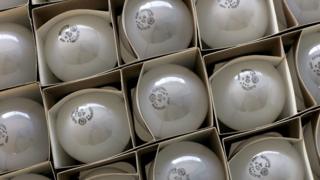 Image copyright
Image copyright
Getty Images
Many countries have phased out incandescent bulbs because they waste energy by making heat
The US is scrapping a ban on energy-inefficient light bulbs which was due to come in at the beginning of 2020.
The rule would have prohibited the sale of bulbs that do not reach a standard of efficiency, and could have seen an end to incandescent bulbs.
Many countries have phased out older bulbs because they waste energy.
But the US energy department said banning incandescent bulbs would be bad for consumers because of the higher cost of more efficient bulbs.
The Department of Energy said it had withdrawn the ban because it was a misinterpretation of the 2007 Energy Independence and Security Act.
Specifically, the law stipulated that restrictions on bulbs could only be implemented when it was economically justified, Shaylyn Hynes, a spokeswoman for the Department of Energy, told the New York Times.
Activists say the government has come under pressure from manufacturers.
“It makes zero sense to eliminate energy-saving light bulb standards that will save households money on electricity bills and cut climate change emissions,” Appliance Standards Awareness Project executive director Andrew deLaski told the Washington Post.
“Instead, the Trump administration is siding with manufacturers that want to keep selling outdated, energy-wasting light bulbs.”
The use of energy-efficient products reduces demand for energy, which in turn reduces carbon emissions which are contributing to the overheating of the planet.
As the planet heats up, ice is melting – including Greenland’s Sermilik glacier, which has thinned by 100m (329ft) in 15 years.

Media playback is unsupported on your device
US President Donald Trump has questioned the scientific consensus that climate change is caused by human activity and requires urgent action.












